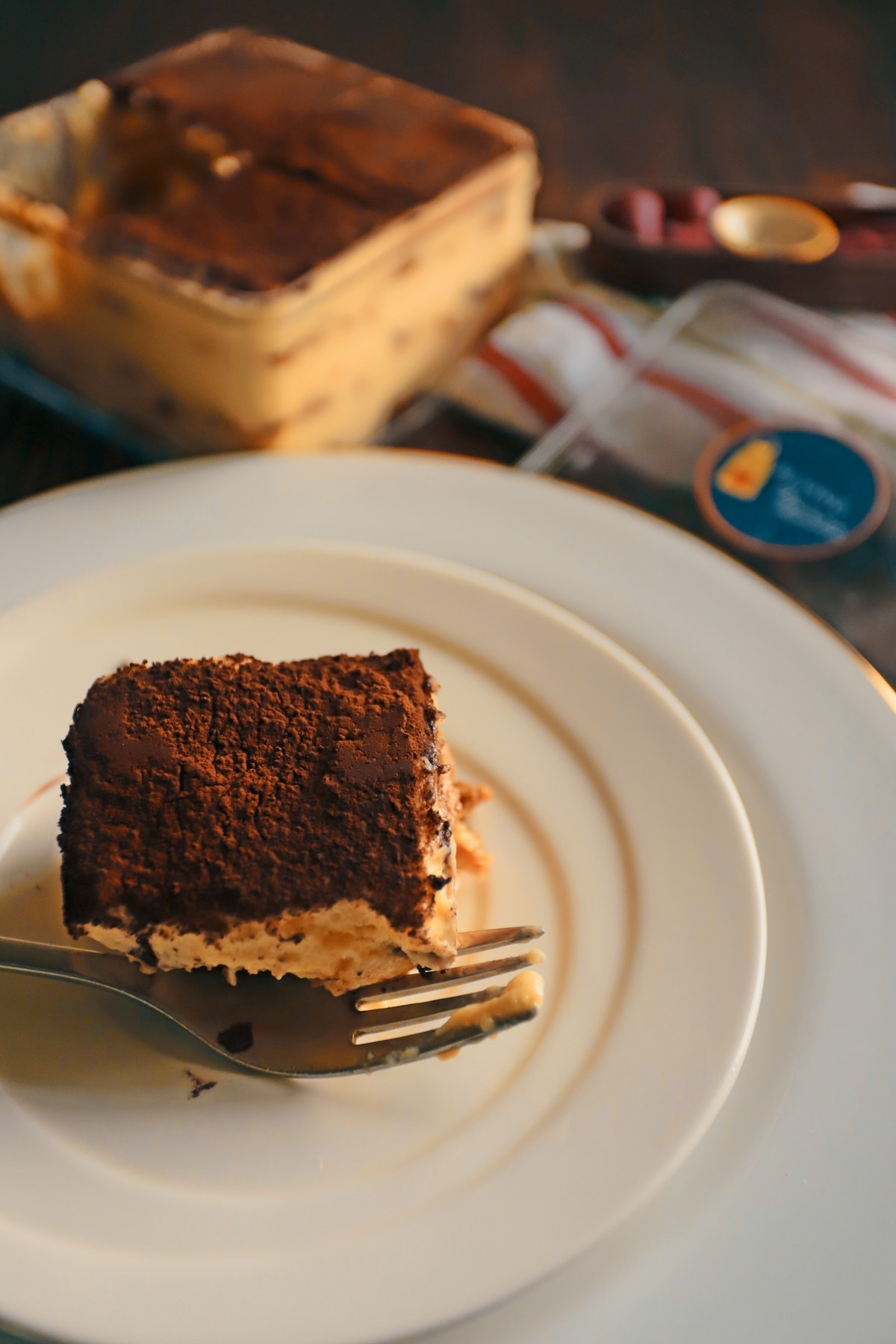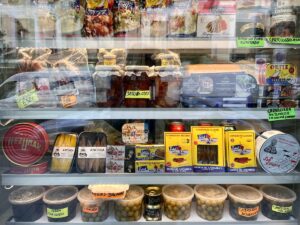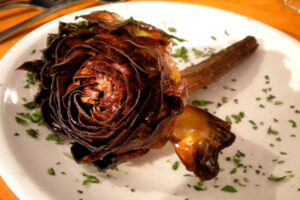Last Updated on October 18, 2025 by Lily Frank | Published: February 4, 2019
It is said that the Roman goddess of food and feasting was named Edesia.
Your standard Ancient Roman goddess, Edesia was essentially in charge of ensuring a feast went well. Hosts of the time knew you’d do best to keep her happy, so they would offer some of the most delicious morsels from any feast as an offering to her.
Now, over in the Eternal City, sweets are sometimes passed over in favor of the main meal. It’s true, there is so much amazing eating to do, from carbonara to amatriciana and back again, but you guys, desserts in Rome are not to be missed! That’s why we’ve compiled a list of our favorites—in no particular order, we’re not ranking cantucci over crostata, as choices like these are intensely personal.
One of the beautiful things about Italy is that different regions boast their own local delicacies. We’ve incorporated treats from around the peninsula in this list, but you can reliably find and enjoy them all in the capital.
A point of extreme importance: this list does not include gelato, the most famed of all the desserts. Stifle your gasps and be not afraid, this is not because gelato is not firmly ensconced in our hearts, but rather because we wanted to focus on the non-frozen treats here. (Don’t worry, though—we’ve got you covered with a complete guide to the best gelato spots in Rome!).
If Edesia is real, we’re fairly certain these are the dolci with which she adorns her table. So, read on, and when you’re visiting Roma, don’t forget to leave a little (or a lot) of space for an after-dinner indulgence paired, of course, with an espresso.

Vin Santo e Cantucci
First a clarification, before all the Tuscans out there (rightfully) have a fit: this combination is born of Tuscany, the next region north from Rome’s own Lazio.
Vin santo is a melodiously sweet dessert wine, and it is divine to sip after a meal. But it doesn’t end here, oh no, because along come the cantucci, a type of almond biscotto that is truly living its best life as a non-cookie.
What you need to do here is dip the cantucci into the vin santo, until there are no more cantucci and no more vin santo. Then you ask for more, and repeat the process.
And that’s it. That’s the key to a happy life.
Crostata ricotta e visciole
How does one describe a crostata?
A bit like a pie but with its own personality, the ricotta cheese and visciole (a tart cherry) variety has Jewish Roman cuisine roots, and is a staple in any Roman restaurant.
Thanks to the slight bite of the cherry and the smoothness of the ricotta, it is sweet but not too much so, and some bakeries or restaurants will also throw in a handful of chocolate chips (and how can you go wrong with that?).
This is one of the most traditional desserts in the city, and one of our favorites worldwide.
Local tip: One of our favorite versions of this crostata can be found on the dessert menu of Flavio Al Velavevodetto, a great little spot in the Testaccio neighborhood. They also make our very favorite rendition of tiramisu, but more on that later. If you try out Flavio, don’t forget to book, as this is a spot popular with locals and you might end up being in for a long wait if you don’t make a prenotazione (booking) beforehand.
Frappe
This egg, sugar, and flour-based bite of deliciousness is seasonal: you can find it sprinkled across the country only during carnival period in Italy (so from January-ish to just before Easter).
Frappe, not to be confused with the milkshake drink frappè, actually goes by different names depending on the region you find yourself in Italy. Fun fact: in the Liguria region they’re known as bugie, which translates directly to “lies.” We tend to think this is because they taste so airy and light the automatic assumption is that they’re also calorically inconsequential, and, well, that is not the case…)
This tradition of the Carnevale season is said to hail from an Ancient Roman sweet made during the same time of year that was deep fried. Since the Romans really got a lot of things right, a variation of this lives on today. In fact, you can find frappe in two versions, either fried or baked in the oven. Here at Devour Tours, we have extremely clear ideas on which one tastes better, but it’s very much a matter of personal preference.
These long, flat strips of dough, which generally also have an alcohol such as sambuca or vin santo in the batter that evaporates during the cooking process, are then generally covered in powdered sugar or honey.
Tiramisu (da Flavio)
This entry comes with a qualifier: not just any tiramisu in Rome, this is the tiramisu from Flavio al Velavevodetto, the famous little Roman osteria we mentioned above when in deep discussion about crostata. This is tiramisu al cucchiaio, soft enough to be scooped up with a spoon. Make sure you get several layers in with each bite to savor the different flavors!
Insider’s tip: Don’t miss our Perfect Italian Tiramisu Recipe
Castagne
We know what you’re thinking: do chestnuts count as dessert?
The answer here is an unequivocal yes, in all their forms.
Seek out the candied marron glacé (that make us swoon) as well as the simple roasted castagna you can scoop up from vendors on every street corner in late autumn and early winter. This is, in fact, a seasonal delight, so pack it in while you can, and don’t forget to breathe in deep: nothing says Christmas in Rome like the smell of roasted chestnuts on Via del Babuino, leading you to Piazza di Spagna.
So there you have it, folks: our very favorite sweetly-oriented dishes, to be enjoyed not just after a meal but at any time of day for a pick-me-up, or during the late afternoon Italian snack time, known as merenda.
Enjoy!
The goddess tiptoes past the delicacies on her table, gazing in appreciation at the offerings laid out before her. The people have done well. She peeks around and, when she is sure nobody is looking, she gracefully reaches out a spoon and piles it high. These togas are truly unforgiving, but after all, tiramisu is tiramisu.
Coffee Granita with Whipped Cream
Coffee Granita is a perfect choice if you are looking for a refreshing dessert.
This dessert is made with a whipped cream base, layered with coffee granita and then another layer whipped cream to top it off. Grantia is a semi frozen dessert similar to shaved ice. If you are not a big fan of coffee, you can easily switch it for a different flavor.
Check out Bar San Callisto and their delicious Coffee Granita with Whipped Cream.
Ready to eat like a real Roman from breakfast through dessert? Our Testaccio Neighborhood Food & Market Tour is just the adventure you need. We’ll give you plenty of pointers on what it means to eat like a Roman, and you’ll even meet the people behind some of our favorite bites in the city.








